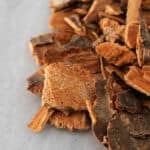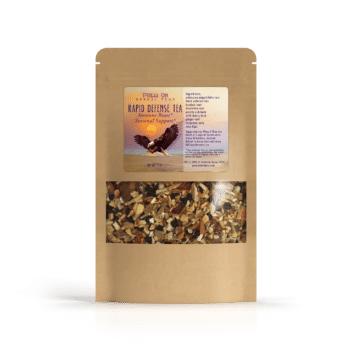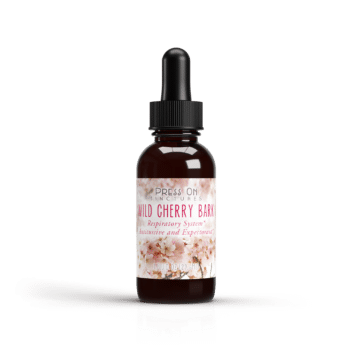
Wild Cherry Bark in Herbal Medicine
Wild Cherry Bark in Herbal Medicine
Wild cherry bark has been a staple in herbal medicine for centuries. Revered for its soothing properties, it has been utilized by various cultures to treat a wide array of ailments, particularly those associated with respiratory health. This article delves into the myriad benefits of wild cherry bark, its historical use as a natural cough remedy, and practical ways you can incorporate it into your herbal medicine cabinet to enhance your health regimen.
What is Wild Cherry Bark?
Wild cherry bark is derived from the inner bark of the Prunus serotina tree, commonly known as black cherry or wild cherry. This tree is native to North America and is easily recognizable by its dark, flaky bark and beautiful white flowers that bloom in the spring. The inner bark, when carefully harvested and processed, provides a range of health benefits due to its rich content of active compounds. This natural remedy has been passed down through generations, gaining a reputation for its ability to soothe and heal.
The Prunus serotina tree thrives in a variety of habitats, from moist, fertile valleys to dry, rocky hillsides, which contributes to its wide availability across North America. The bark is typically harvested in the spring and early summer when the tree’s sap is running, ensuring the highest concentration of beneficial compounds. Once collected, the bark is dried and prepared for use, either as a tea, tincture, or other forms, making it a versatile addition to any herbalist’s toolkit.
Key Compounds in Wild Cherry Bark
Wild cherry bark contains several beneficial compounds, including:
- Cyanogenic glycosides: These compounds release small amounts of cyanide, which in low doses, can help relax the muscles and have a sedative effect. This action can be particularly beneficial in calming the nervous system and aiding in restful sleep, making it a valuable remedy for those suffering from insomnia or stress-related conditions.
- Tannins: Known for their astringent properties, tannins help reduce inflammation and irritation in the body. They work by constricting tissue proteins, which can help heal wounds and reduce swelling, making them effective in treating sore throats and other inflammatory conditions.
- Flavonoids: These antioxidants help combat oxidative stress and support overall health. By neutralizing free radicals, flavonoids protect the body’s cells from damage, reducing the risk of chronic diseases such as heart disease and cancer. Their presence in wild cherry bark contributes to its reputation as a health-promoting natural remedy.
Benefits of Wild Cherry Bark
The benefits of wild cherry bark are numerous, making it a popular choice in natural medicine. Its applications extend beyond mere symptom relief, offering a holistic approach to health management.
Natural Cough Remedy
One of the most well-known uses for wild cherry bark is as a natural cough remedy. The bark’s soothing and anti-inflammatory properties can help alleviate coughs by calming the irritated tissues in the throat and respiratory tract. It is particularly effective for dry, unproductive coughs, which can be stubborn and persistent. By coating the throat and reducing irritation, wild cherry bark helps to suppress the reflex that triggers coughing, providing much-needed relief.
In addition to its direct effects on the throat, the sedative properties of wild cherry bark can help relax the body, reducing the overall tension that often accompanies persistent coughing. This dual action makes it a valuable ally during cold and flu season, providing comfort and aiding recovery. For those who prefer natural remedies, wild cherry bark offers an effective alternative to over-the-counter cough medications, which often come with unwanted side effects.
Respiratory Health Support
Wild cherry bark can also support overall respiratory health. By reducing inflammation and irritation in the airways, it can ease breathing difficulties and reduce the frequency and severity of coughing fits. This makes it an excellent choice for individuals suffering from chronic respiratory conditions like bronchitis or asthma, where inflammation plays a key role.
Its ability to enhance lung function and clear mucus buildup further supports respiratory health, making breathing more comfortable and efficient. Regular use of wild cherry bark, under the guidance of a healthcare professional, may contribute to better management of chronic respiratory conditions, improving quality of life and reducing dependency on pharmaceutical interventions.
Digestive Aid
In addition to its respiratory benefits, wild cherry bark can aid in digestion. The tannins present in the bark can help soothe an upset stomach and relieve symptoms of diarrhea by reducing inflammation in the gastrointestinal tract. This makes wild cherry bark a natural remedy for digestive disturbances, offering relief from discomfort and promoting gut health.
Moreover, its astringent properties can help tone the digestive tract, improving its overall function and reducing symptoms of bloating and gas. By incorporating wild cherry bark into your routine, you may find an improvement in your digestive health, leading to better nutrient absorption and increased energy levels.
Anti-inflammatory Properties
The anti-inflammatory properties of wild cherry bark extend beyond the respiratory and digestive systems. It can also help reduce inflammation in other parts of the body, providing relief from conditions like arthritis and muscle pain. By inhibiting the production of inflammatory compounds, wild cherry bark helps to alleviate pain and swelling, promoting mobility and comfort.
This makes it a valuable addition to the natural management of chronic inflammatory conditions, offering a gentler alternative to non-steroidal anti-inflammatory drugs (NSAIDs), which can have adverse side effects with long-term use. For those seeking a holistic approach to pain management, wild cherry bark provides a versatile and effective option.
How to Use Wild Cherry Bark
There are several ways to incorporate wild cherry bark into your herbal medicine routine, each offering unique benefits and convenience.
Wild Cherry Bark Tea
One of the simplest ways to enjoy the benefits of wild cherry bark is by making a tea. To prepare, simply steep one to two teaspoons of dried wild cherry bark in hot water for about 10 minutes. Strain and enjoy. This soothing tea can be consumed up to three times a day to help alleviate coughs and support respiratory health.
In addition to its health benefits, wild cherry bark tea offers a calming ritual that can be integrated into your daily routine. The process of brewing and sipping the warm tea can provide a moment of relaxation and mindfulness, helping to reduce stress and promote overall well-being. For added flavor and benefits, consider combining wild cherry bark with other herbs like honey or lemon, which can enhance its taste and therapeutic effects.
Tinctures and Syrups
Wild cherry bark tinctures and syrups are also available and provide a more concentrated dose of the bark’s beneficial compounds. These can be found in health food stores or made at home by soaking wild cherry bark in alcohol or glycerin for several weeks. Tinctures offer a convenient and potent way to access the health benefits of wild cherry bark, allowing for easy dosage adjustments.
Syrups, on the other hand, can be a soothing option for children or those who prefer a sweeter taste. By combining wild cherry bark with honey or maple syrup, you create a palatable remedy that retains all of its therapeutic qualities. Both tinctures and syrups can be used as needed, making them a versatile addition to your natural medicine cabinet.
Capsules and Tablets
For those who prefer a more convenient option, wild cherry bark is also available in capsule or tablet form. These supplements can provide a standardized dose of the bark’s active compounds and are easy to incorporate into your daily routine. Capsules and tablets offer a portable solution for those on-the-go, ensuring you can maintain your health regimen even with a busy lifestyle.
When selecting capsules or tablets, look for high-quality products from reputable brands to ensure potency and purity. Always follow the recommended dosage and consult with a healthcare professional to determine the best form and dosage for your individual needs.
Precautions and Side Effects
While wild cherry bark is generally considered safe for most people, there are some precautions to be aware of. Understanding these can help you use wild cherry bark responsibly and effectively.
Use with Caution
Due to the presence of cyanogenic glycosides, wild cherry bark should be used with caution, particularly in large doses. It is always best to start with a small amount and gradually increase as needed, under the guidance of a healthcare professional. This careful approach minimizes the risk of adverse effects and ensures that you are using the herb safely and effectively.
Additionally, individuals with certain health conditions, such as liver disease or compromised kidney function, should exercise additional caution. These conditions may affect how the body processes wild cherry bark, potentially leading to increased sensitivity or adverse reactions. Consulting a healthcare provider before use is essential to ensure safety.
Avoid During Pregnancy
Pregnant or breastfeeding women should avoid using wild cherry bark due to the potential effects of its active compounds on the fetus or infant. The presence of cyanogenic glycosides poses a risk, as they can cross the placenta or be passed through breast milk, potentially affecting the developing child.
If respiratory or digestive issues arise during pregnancy or breastfeeding, it is advisable to seek alternative remedies that are proven safe for use during these sensitive periods. Always consult with a healthcare professional before introducing any herbal supplements into your routine while pregnant or nursing.
Possible Allergic Reactions
Some individuals may experience allergic reactions to wild cherry bark. If you notice any signs of an allergic reaction, such as skin rash, itching, or difficulty breathing, discontinue use immediately and consult a healthcare provider. Allergic reactions can vary in severity, and prompt attention is crucial to prevent complications.
As with any herbal remedy, it is important to start with a small dose to assess your body’s response. Conducting a patch test or consuming a small amount initially can help identify potential allergies without significant risk. Always prioritize safety and listen to your body’s signals.
Conclusion
Wild cherry bark is a powerful ally in herbal medicine, offering a natural remedy for coughs and respiratory issues, along with other health benefits. By understanding how to use it safely and effectively, you can harness the healing properties of this remarkable bark to support your overall well-being.
With its long history of use and numerous benefits, wild cherry bark remains a valuable addition to any herbal medicine cabinet. Always consult with a healthcare professional before incorporating new herbal remedies into your routine, especially if you have underlying health conditions or are taking other medications. By doing so, you can confidently explore the benefits of wild cherry bark and other natural remedies, enhancing your health and vitality through the wisdom of traditional medicine.



